Semi-Annual Report -2025
Ghawth is a local NGO established in 2009 by a group of doctors in Lebanon. The aim for establishing this NGO is to enhance the medical services for refugees and host community, and to ensure that the most vulnerable population groups will have access to primary, secondary, and tertiary healthcare services.
The 2025 semi-annual report summarizes the progress made by Ghawth in its program goals, which fits with the following outcomes of the Lebanon Response Plan (LRP)-2025:
- Improve access to comprehensive primary healthcare (PHC).
- Improve access to the hospital and advanced referral care.
In addition, it identifies challenges, priorities, and recommendations.
- Achievements of Ghawth:
The total number of beneficiaries in the first half of 2025 reached 31,139, with 11,723 males (38%) and 19,416 females (62%).
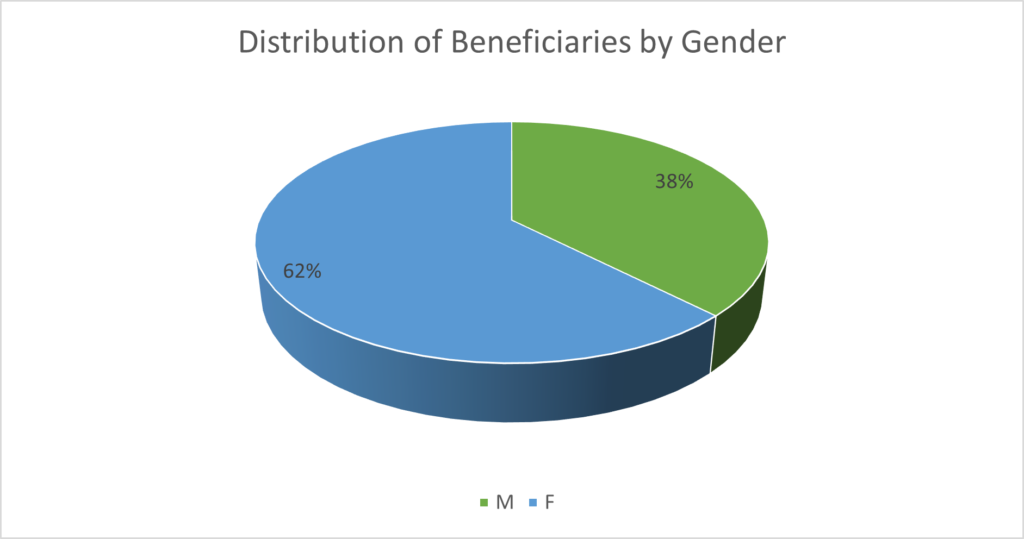
The decrease in the number of beneficiaries from the previous year (30 %) and does not reflect the reality of the health situation in Lebanon; it is due to:
- The changing security and political situation in Syria and the fall of the Assad regime in late 2024 prompted many Syrian refugees in Lebanon to return to their homeland, particularly those residing in camps.
- A shortage of funds rather than an improvement in health.
The table below compares the number of beneficiaries in first half of 2022, 2023, 2024 and 2025.
| Year | 2022 | 2023 | 2024 | 2025 |
| # Of Beneficiaries | 46,300 | 46,734 | 44,501 | 31,139 |
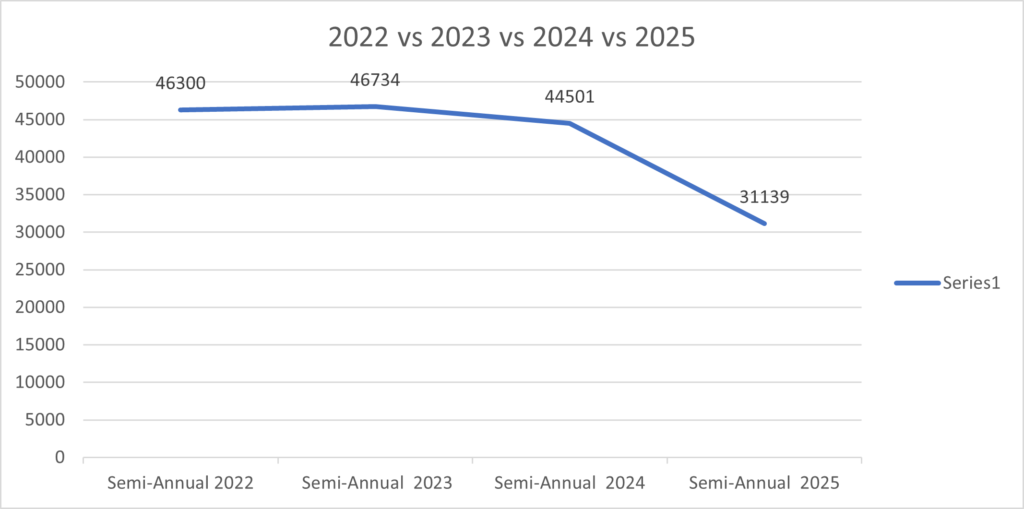
Even with the overall decrease in beneficiaries, a notable shift has occurred: the percentage of Lebanese beneficiaries has risen in the last few months of the first half of this year.
The distribution of the number of beneficiaries by nationality is shown in the table below:
| Nationality | # | % |
| Syrian | 20608 | 66.18% |
| Lebanese | 9710 | 31.18% |
| PRL | 199 | 0.64% |
| PRS | 505 | 1.62% |
| Other | 0 | 0.00% |
| Total | 31,139 | 100% |
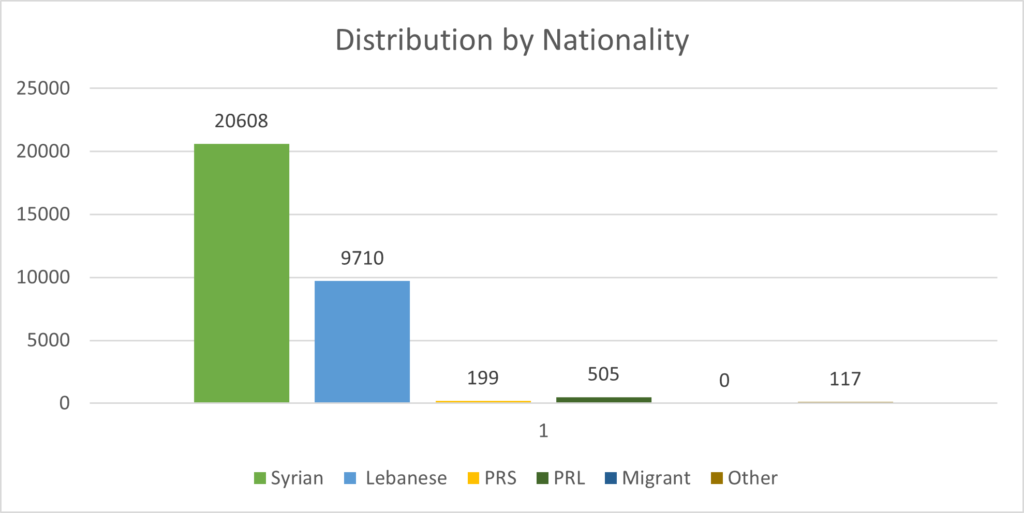
- Primary Health care:
GHAWTH provides primary health care services to vulnerable Lebanese as well as other populations such as PRL, PRS, Syrian refugees, and migrants through four medical centers (PHCCs).
- Dar Al Wafaa PHC.
- Medical Village Dispensary.
- Ghawth Dispensary-Aarsal (MCA).
- Al Rawda Dispensary.
GHAWTH, with the support of NORWAC, IMC, and IOCC, is dedicated to strengthening Lebanon’s health system through its comprehensive primary healthcare program. In the first half of 2025 alone, the organization provided a wide range of services, including:
- 29,905 medical consultations
- Vaccinations for 1,250 children
- Medication for 13,360 patients
The complete package of services covers a wide spectrum of health needs, from managing illnesses to promoting well-being. These services include:
- Consultations and vaccinations
- Medication for both acute and chronic conditions
- Child and sexual and reproductive health
- Noncommunicable disease care
- Malnutrition screening and management
- Mental health and disability services
- Dental care
- Health promotion and referral
This approach ensures that communities have access to a full range of essential healthcare services, reinforcing GHAWTH’s commitment to building a stronger, more resilient health system in the region.
- Beneficiaries Distribution by Medical Center:
The total number of Beneficiaries in the first half of 2025 are distributed on the four following medical centers:
| Medical Center | # | % |
| Rawda | 5,047 | 17% |
| Dar Al-Wafaa PHC | 5,781 | 19% |
| MCA | 13,053 | 44% |
| Medical Village | 5,874 | 20% |
| Total | 29,755 | 100% |
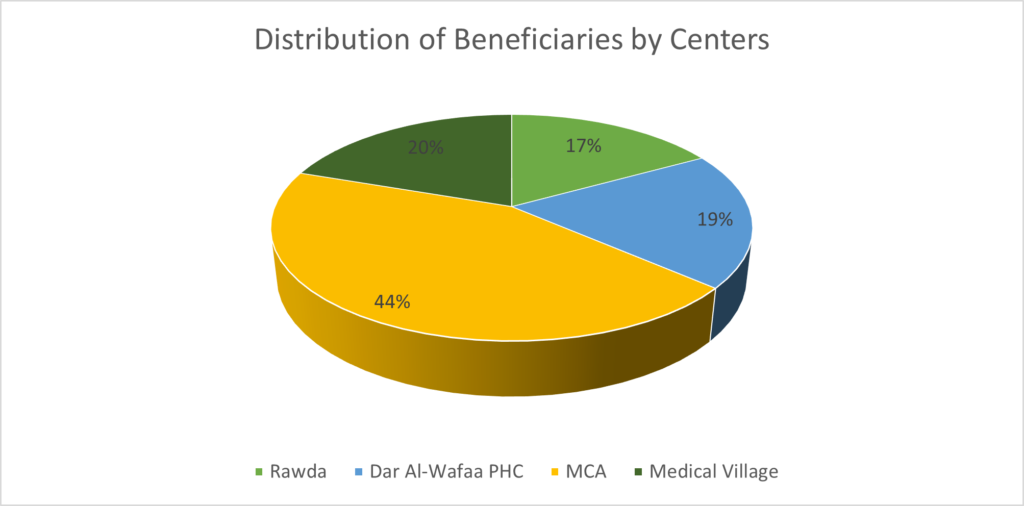
- Consultations Distribution by Clinic:
Women and children constitute the largest number of beneficiaries of primary health care services (82%), as the table below shows the distribution of 29,505 consultations by clinics:
| Clinic | # | % |
| General Medicine | 5,571 | 19% |
| Pediatric | 9,622 | 33% |
| Dentist | 3,912 | 13% |
| Gynaecology | 5,946 | 20% |
| Cardiology | 890 | 3% |
| General Surgery | 113 | 0% |
| Orthopedic | 1,279 | 4% |
| Gastroenterology | 98 | 0% |
| Dermatology | 361 | 1% |
| Urology | 310 | 1% |
| Ophthalmology | 43 | 0% |
| Emergency cases | 155 | 1% |
| In Patient | 153 | 1% |
| ENT | 250 | 1% |
| Endocrinology | 0 | 0% |
| Mental Health | 802 | 3% |
| Total | 29,905 | 100% |
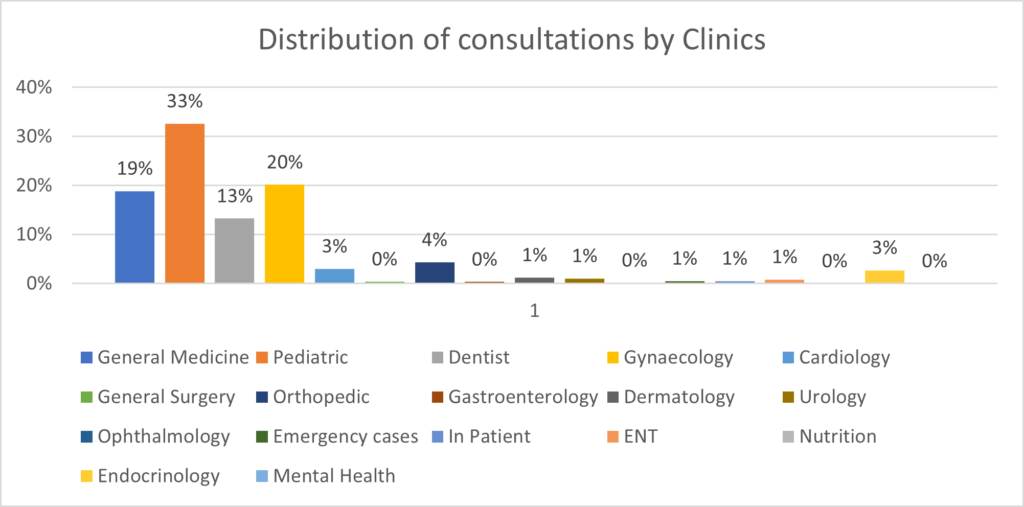
2-Secondary Health Care:
GHAWTH provides secondary healthcare services, including surgeries and dialysis, to vulnerable populations in Lebanon. The organization’s support extends to Lebanese citizens, Palestinian refugees (PRL and PRS), Syrian refugees, and migrants. These services are offered through GHAWTH Medical Centers and contracted hospitals across the country.
In the first half of 2025, GHAWTH supported 134 surgeries and 2,658 dialysis sessions, with funding from NORWAC. Of the patients who received dialysis, 51 were Syrian refugees.
The distribution of the number of dialysis patients by gender is shown in the table below:
| Beneficiaries Distribution by Gender (Dialysis Sessions) | ||
| Gender /#, % | # | % |
| Total Male | 27 | 53 % |
| Total Female | 24 | 47% |
| Total | 51 | 100% |
GHAWTH, in collaboration with NORWAC and supported by the Norwegian Ministry of Foreign Affairs, initiated a new project to Support the Turkish Trauma and Emergency Hospital in Sidon, which is operated by the Lebanese Ministry of Public Health. The Project aims to:
- Cover the salaries for 75 nurses for 6 months.
- Provide the medical consumables, medication, and equipment as needed.
- Support to the Hospital Management Team.

In the first half of 2025 Ghawth cover the salaries for 97 nurses and doctors for 4 months.
The distribution of the number of beneficiaries by gender and nationality is shown in the table below:
| Nationality / Gender | Lebanese | PRL | Syrian | Others | Total |
| Male | 40 | 22 | 0 | 0 | 62 |
| Female | 27 | 8 | 0 | 0 | 35 |
| Total | 67 | 30 | 0 | 0 | 97 |
Employees distribution by nationality:

Seven international organizations (Interburns, MAP, Med Globle, MSF, UK-Med,ICRC and NORWAC) are supporting the hospital as it implements the project, which includes the provision of equipment, medicines, and training.
in the first half of 2025, 1,236 patients received medical services at Turkish Hospital.
The table below provides the distribution of 1,236 patients based on gender and nationality:
| Nationality/Gender | Lebanese | PRL | Syrian | Others | Total |
| Male | 566 | 104 | 185 | 9 | 864 |
| Female | 268 | 60 | 37 | 7 | 372 |
| Total | 834 | 164 | 222 | 16 | 1236 |
- The challenges:
Multiple and overlapping socioeconomic crises have made it even harder for displaced and other vulnerable people—including women, men, girls, and boys—to get essential primary and secondary healthcare.
1. Challenges Related to Displacement and Patient Numbers
The shifting political and security situation in Syria, especially after the fall of the Assad regime in late 2024, has caused many Syrian refugees in Lebanon to return home. This decrease in the refugee population has made it difficult for Ghawth to meet its planned patient targets.
2. Access and Affordability Challenges
In the first half of 2025, the primary barrier to accessing healthcare was affordability. This includes not only the direct costs of treatment, such as surgery and medication, but also indirect costs like transportation.
3. Funding and Resource Challenges
Due to ongoing global crises, donor support has been restricted, leading to significant funding challenges for most NGOs in Lebanon. For Ghawth, this has severely limited its ability to meet the increasing demand for both primary and secondary healthcare. The lack of funding directly reduces healthcare access, which can lead to higher rates of illness and death. As a result, in the first half of 2025, Ghawth was forced to prioritize life-saving interventions, leaving less critical cases underfunded. For instance, the number of patients in the dialysis project had to be reduced from 51 to just 11.
- Priorities, and Recommendations:
Priorities:
The top priorities should be to maintain essential, life-saving services, adapt to a changing patient demographic, and diversify funding streams. The shift in the Syrian refugee population and the subsequent drop in patient numbers, combined with a severe funding crisis, means that Ghawth can no longer rely on its previous operational model.
1. Secure Core Services:
Life-Saving Interventions: Continue to prioritize life-saving services like the dialysis project, as these are the most critical for patient survival. This is a non-negotiable priority given the limited funding.
Essential Healthcare: Ensure that basic primary and secondary healthcare services remain available, as their absence can lead to more critical and costly health issues in the future.
2. Adapt to Patient Demographics:
Serve Host and Other Vulnerable Communities: The decline in the Syrian refugee population presents an opportunity to pivot and better serve the host community in Lebanon and other vulnerable populations. This could help maintain patient numbers and demonstrate adaptability to donors.
3. Address Affordability and Access:
Reduce Indirect Costs: Focus on mitigating barriers like transportation and other indirect costs that prevent patients from accessing care, even when services are available.
Recommendations:
To address the challenges and achieve the priorities, Ghawth should implement the following recommendations:
1. Strategic & Operational Adjustments
Implement a Targeted Patient Strategy: Shift the focus from a broad refugee-centric model to a more localized and need-based approach that also includes the host community and other vulnerable groups. This will help sustain patient numbers and justify continued funding.
Establish Mobile Clinics: To overcome the challenge of transportation costs for patients, deploy mobile clinics or establish satellite health points in underserved areas. This can make healthcare more accessible and reduce a key barrier to treatment.
Introduce a Triage System: Create a more formal and transparent triage system to ensure that the most critical cases receive priority funding and care. This helps manage limited resources effectively and ethically, especially for non-life-threatening conditions.
2. Financial and Donor Strategy
Diversify Funding: Actively seek out and secure new funding from a wider range of donors, including private foundations, corporate partnerships, and individual philanthropic efforts. This reduces reliance on a small number of traditional government or international donors.
Demonstrate Impact and Efficiency: Strengthen monitoring and evaluation systems to rigorously measure the impact of every intervention. Use this data to create compelling reports for potential donors, highlighting how even limited funds are being used to save lives and provide essential care.
Communicate Clearly with Donors: Engage in frank and transparent conversations with current and potential donors about the evolving needs and the challenges faced. Present a clear, data-driven case for how funding cuts directly affect the well-being of the population. This can help advocate for more flexible and reliable funding.
3. Collaboration and Partnerships
Partner with Other NGOs: Collaborate with other NGOs in the region to share resources, reduce overhead costs, and avoid service duplication. This can increase efficiency and present a unified front to donors.
Engage with Local Authorities: Work closely with Lebanese government and local authorities to integrate Ghawth’s services with the national healthcare system, where possible. This can help secure additional support and improve the sustainability of services.
4. Continue to provide support to government hospitals such as the Rafik Hariri University Hospital, ensuring enhanced access to secondary healthcare for the most vulnerable groups.
5. The Ministry of Public Health and the Social Security Fund are no longer able to cover the costs of surgical operations for the most vulnerable Lebanese patients who do not have third-party coverage. As a result, alternate funding is required to handle such cases.
Support for Lebanese patients also contribute to social stability and decreases conflict between the Lebanese and refugee communities in Lebanon.
September 5, 2025
Prepared by Approved by
Senior Program Officer Executive Director
Ziad Aziz Dr. Abdullah Alomari

